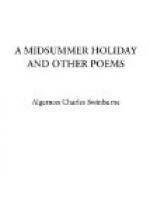[Footnote 1: Titus Andronicus, Act iv., Scene 2.]
IV.
Shame, such as never yet dealt heavier stroke
On heads more shameful, fall on theirs
through whom
Dead men may keep inviolate not their
tomb,
But all its depths these ravenous grave-worms choke
And yet what waste of wrath were this, to invoke
Shame on the shameless? Even their
twin-born doom,
Their native air of life, a carrion fume,
Their natural breath of love, a noisome smoke,
The bread they break, the cup whereof they drink,
The record whose remembrance damns their
name,
Smells, tastes, and sounds of nothing
but of shame.
If thankfulness nor pity bids them think
What work is this of theirs, and pause
betimes,
Not Shakespeare’s grave would scare
them off with rhymes.
LOVE AND SCORN.
I.
Love, loyallest and lordliest born of things,
Immortal that shouldst be, though all
else end,
In plighted hearts of fearless friend
with friend,
Whose hand may curb or clip thy plume-plucked wings?
Not grief’s nor time’s: though these
be lords and kings
Crowned, and their yoke bid vassal passions
bend,
They may not pierce the spirit of sense,
or blend
Quick poison with the soul’s live watersprings.
The true clear heart whose core is manful trust
Fears not that very death may turn to dust
Love lit therein as toward a brother born,
If one touch make not all its fine gold rust,
If one breath blight not all its glad
ripe corn,
And all its fire be turned to fire of
scorn.
II.
Scorn only, scorn begot of bitter proof
By keen experience of a trustless heart,
Bears burning in her new-born hand the
dart
Wherewith love dies heart-stricken, and the roof
Falls of his palace, and the storied woof
Long woven of many a year with life’s
whole art
Is rent like any rotten weed apart,
And hardly with reluctant eyes aloof
Cold memory guards one relic scarce exempt
Yet from the fierce corrosion of contempt,
And hardly saved by pity. Woe are
we
That once we loved, and love not; but we know
The ghost of love, surviving yet in show,
Where scorn has passed, is vain as grief
must be.
III.
O sacred, just, inevitable scorn,
Strong child of righteous judgment, whom
with grief
The rent heart bears, and wins not yet
relief,
Seeing of its pain so dire a portent born,
Must thou not spare one sheaf of all the corn,
One doit of all the treasure? not one
sheaf,
Not one poor doit of all? not one dead
leaf
Of all that fell and left behind a thorn?
Is man so strong that one should scorn another?




